Should I free range my chickens and bantams?
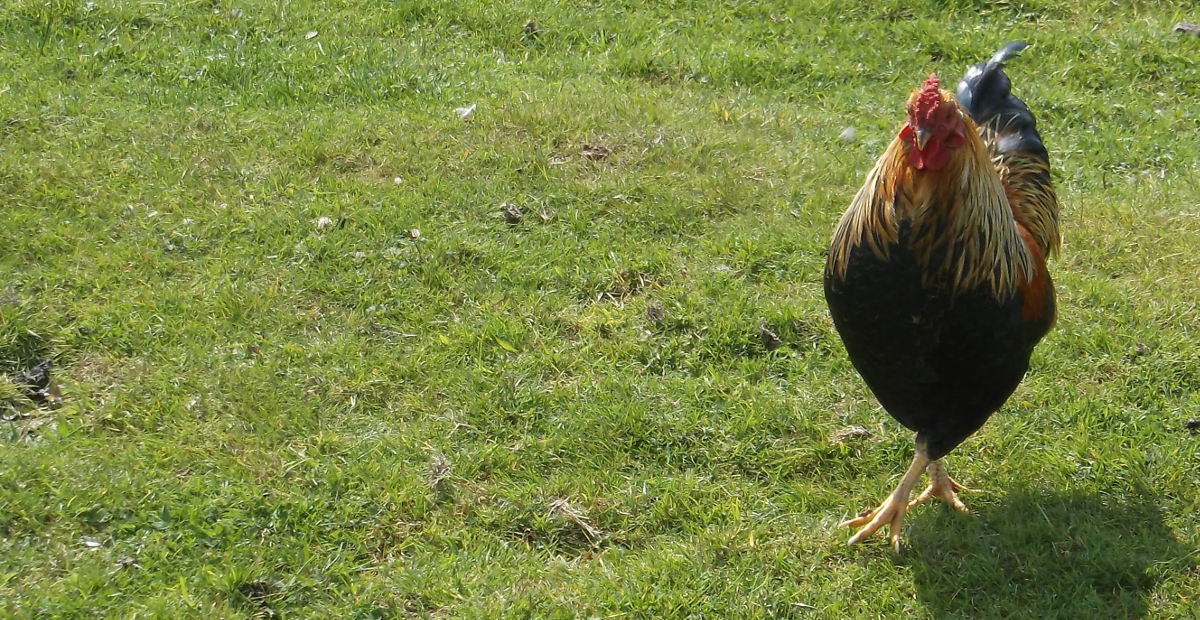
Free ranging is a personal choice chicken keepers need to make.
Should you free range your chickens?
Deciding weather to free range your bantam chickens is a balancing act dependant on your circumstances and the conditions of your site. Sharing your land with certain predators means you might need to take more care or restrict the space they have to roam.
Below: I free range all my chickens.
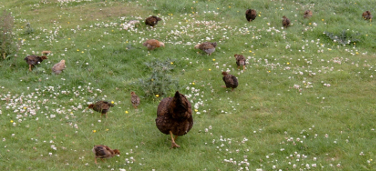
Free ranging chickens provides them with a bigger area and more variety to behave naturally. You should take a few precautions before you start letting your hens out to wander.
What are the problems with free ranging chickens?
- Predators is the main problem.
- Laying away from the nest boxes.
- Rearing a brood in the wild.
- Roosting in the trees or on buildings.
- Theft of chickens and loss.
- Raiding your garden and scratching up your flowers.
Below: Free range hens have more opportunity to get into trouble Here they are eating my herbs.
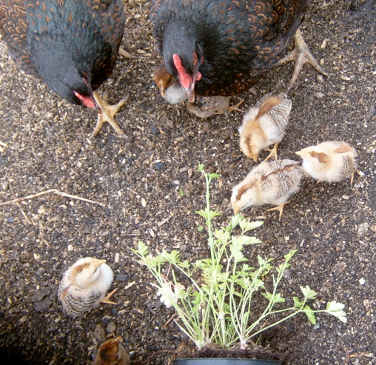
The big problem with free ranging chickens is they come into contact with all manner of predators from foxes and raccoon's to birds of prey and dogs.
How do you stop them leaving or flying away?
People always wonder how you stop free range hens running away. I can safely say it is never a problem I have had. I have had the odd escape artist but they normally settle down after a wing clip.
Below: A chicken doing what they are meant to do. Happy chickens never fly away.
Well fed and cared for hens will never stray far from the coop and it is very rare that you might get a lost hen.
What age can you let chickens free range?
Getting some experience of being out and about is good for growing chickens.
You can let chickens free range on their own from about 8 weeks if the weather is normal. The standard rules of making sure they have been in the coop for at least 3 days still stands.
Below: It is more important that they are well feathered as opposed to their actual age. This is about the best size.
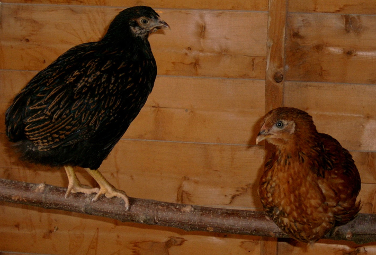
If you live in a cold or wet area then it would be better to wait till they are 10 to 12 weeks old.
Chicks of any age can be raised free range with their mum. I have taken chicks that were just 3 days old out for 15 minutes at a time in warm, dry and sunny weather. I am always amazed how quickly they start dust bathing, scratching and pecking at things.
Do I have to let my chickens out of the coop?
There are a few options, you can open the door for them every morning and shut it again after the roost in the evening or you can buy yourself an automatic door closer.
If you have a sturdy and secure run then you can leave the pop hole open all the time. You should always have a way of shutting the door between coop and run in case you need to keep the flock in one side or the other.
You should never leave open access to the birds overnight or they will get eaten at some point.
Should you let chickens free range in winter?
I do. You need to use your judgement. Wind chill and really cold weather will damage combs and freeze feet.
I often find wet weather is more of a problem than snow and ice.
Below: My hens in winter.
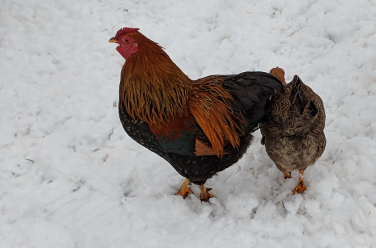
Avoid persistently frozen weather, ice rain etc but normal winter days are just fine, even if there is lying snow.
Are chickens good for your yard?
Probably not. The peck and scratch and dust bathe wherever they want to. Mine raid the fruit bushes as well and compact certain popular spots so no grass grows there.
Below: Hens having a dust bath in a flowerbed.
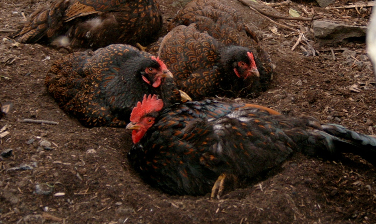
What times can I let my chickens free range?
I have an automatic door opener that lets them out at first light and closes at dusk. I have never had them shut out by accident.
If you are worried then let them out in the late afternoon for the first few times. then they will have the urge to roost not long after you let them out.
Trying to let them out in the morning and hoping to shuffle them all back inside during the middle of the day is unlikely to go well and will cost a fortune in treats.
Letting chickens free range for the first time:
- Make sure they have been in the coop for at least 3 days and 4 night. this gives them time to settle.
- Don't let them out if they are agitated or flighty. They could end up stuck behind sheds or in trees.
- Have the feed and water ready in the run so they have to go back in to feed.
- Have treats to hand for distractions.
- On the first day let them out just and hour or so before they normally roost. They won't wander far.
- Take all sensible precautions against predators. Do some research and know what you are dealing with.
How far will free range chickens roam?
Chickens will range between 100 and 800 yards from the coop if you have that much room. Areas and territories vary over time and they have their favourite spots.
If you have a cockerel in your flock they will wander further. Roosters do tend to lead the hens astray a little.
I have found it makes little difference whether they are bantams or large fowl. A free range chicken will have a map in their head of where they like going and what they like doing and will scratch about all over the place.
Mine seem quite happy to stay within the property boundaries but then they are on 4 acres.
How long to keep chickens in coop before free ranging?
At least 3 days and 4 nights. Less than this and they might not remember where home is and may end up in trees or on roofs.
Do free range chickens need a run attached to the coop?
No. You do not always need a run attached to the coop.
It does depend on your situation. Here in the north of England with good fences I can safely free range my chickens from dawn till dusk with few problems. I have had birds of prey take chicks in the past so I have covered broody runs.
Is there enough room to free range all chickens?
There is plenty of land available for all hens, in the UK and elsewhere, to be free range.
Suppose we stocked at 10 sq.m per chicken (the Organic standard) – which is the highest standard for chickens. If you assume that there are 30 million laying hens in the United Kingdom. Each one would need 10 square metres so 30 million hens x 10 sq metres = 300,000,000 sq.m or 300 sq. Km.
The area of the UK is 245,000 sq. Km. This means the hens would use just 0.122% of the UK land area.
According to DEFRA:- Grasses & rough grazing = 51.52% Crops & bare fallow = 18.9% Set aside = 3.5% Forestry = 11.65%. So 0.122% is an not an impossible or unattainable figure. Lack of land area is not an excuse for keeping hens caged up.
Free-range hens are happier and healthy hens.
What I do know is that, without exception, people who keep their own garden hens insist that the flavour, albumin and yolk quality of their eggs is far superior to those of intensively produced eggs.
In my experience, a muscular, fit and athletic hen will produce a quality of egg which cannot be matched by an egg produced in the cramped, unhealthy, environment of the battery egg farm, and it is a sad fact that a large percentage of the population has never eaten, and does not know what a real egg is.
Do free range hens produce better eggs?
In my opinion as well as quite a few other keepers free range chicken do produce nutritionally superior eggs.
Mother Earth News conducted an egg testing project in 2007, finding that eggs produced by free-range hens compare favourably with those produced by battery cage hens.
Eggs from free range hens had up to:
2/3 more vitamin A
2 times more omega-3 fatty acids
3 times more vitamin E
7 times more beta carotene
The study involved 14 flocks across the United States whose eggs were tested by an accredited Portland, Oregon, laboratory, and the results were similar to those obtained via a 2005 study of four flocks.
In addition to the Mother Earth News research findings, there have been a number of other studies showing that free-range eggs are healthier than those produced by battery-cage hens.
Chicken used to be considered a luxury but mass production of fast growing strains has led to chicken being the cheapest meat. But as with so much in life, there is no such thing as a free lunch.
With both eggs and meat from chickens what we have gained in "value" we have lost, not just in animal welfare but also in flavour, texture and nutritional value.
Why the price difference between free range and confined eggs?
There are several factors but perhaps the most significant is that the farmers who rear conventional chickens may only be making 10 or 20c/p profit per bird.
At this rate you can see why they need to do hundreds of thousands of chickens per unit in order to have a viable business.
On smaller units, like ours, there needs to be more margin per bird for a small, extensive system that produces such good flavour, texture and taste to be viable.
Inevitably, as a small producer you pay more for your food, straw and chicks than a large scale unit who can command volume discounts.
For farmers to embrace the idea that quality at a slightly higher price is better than quantity, and that the majority of their customers actually want a more ethically produced eggs, and from my experience they are prepared to pay.
The issue of animal welfare will never be settled as long as we, the public retain the opinion that we have some kind of divine right to cheap eggs.
An egg or two is a very cheap meal for one person, a bar of chocolate is at least double the price is a very expensive luxury with a small fraction of the food value.
If battery hen egg production is the only way we can get enough eggs, how can a compassionate way of farming produce the volume of eggs needed to satisfy demand?
